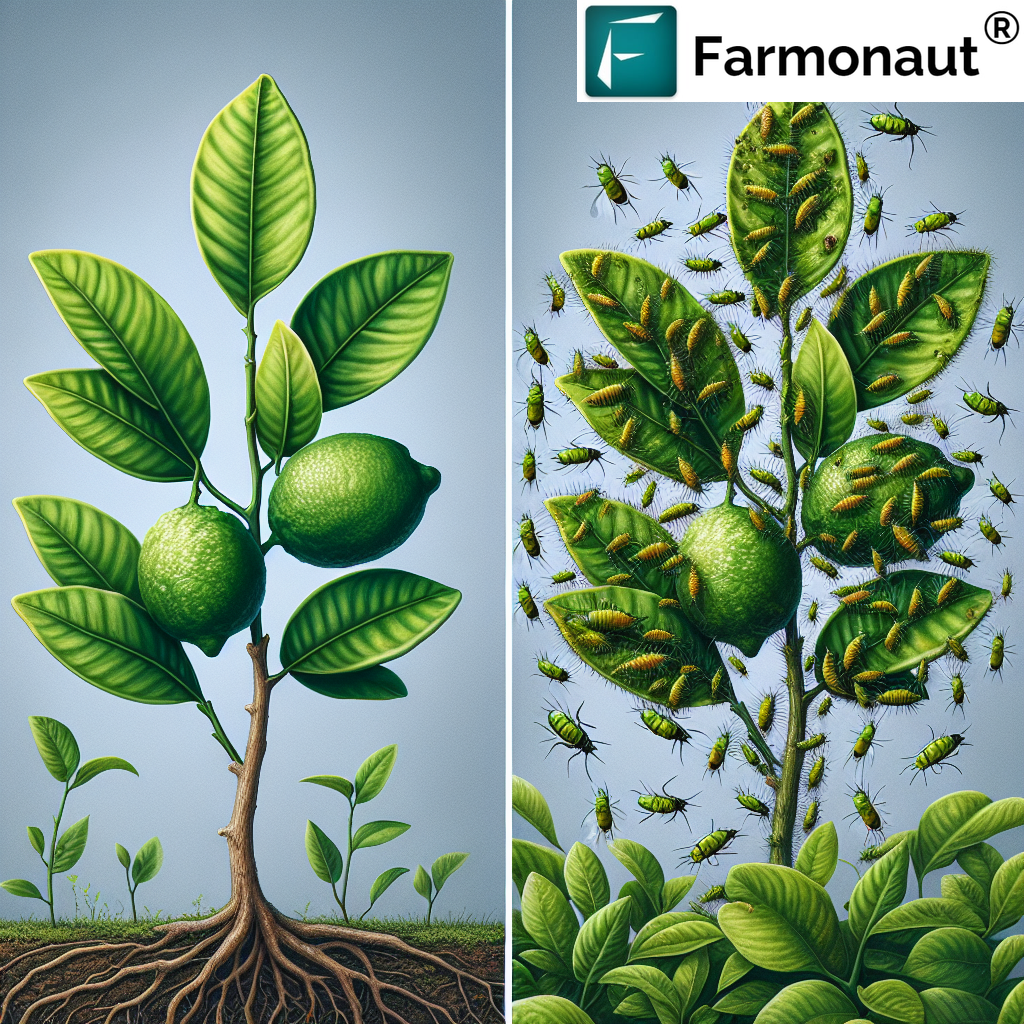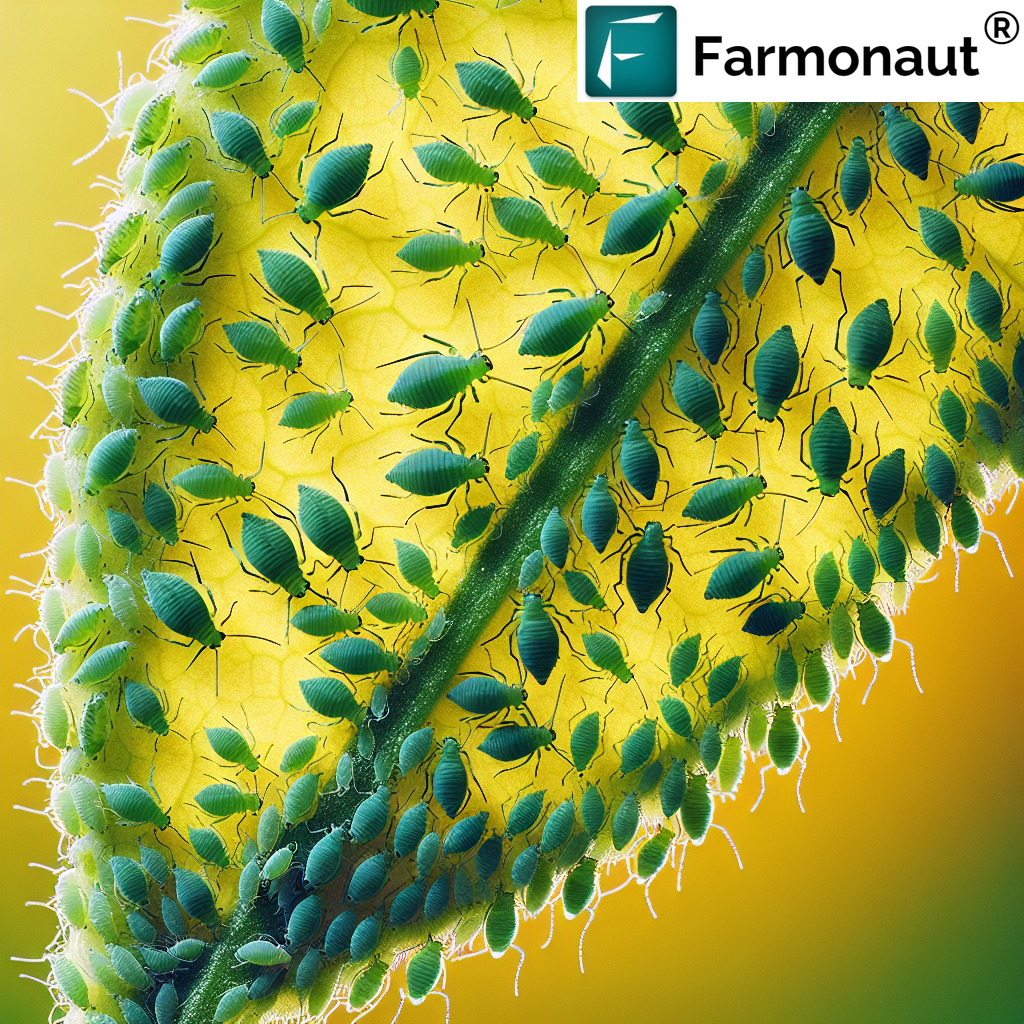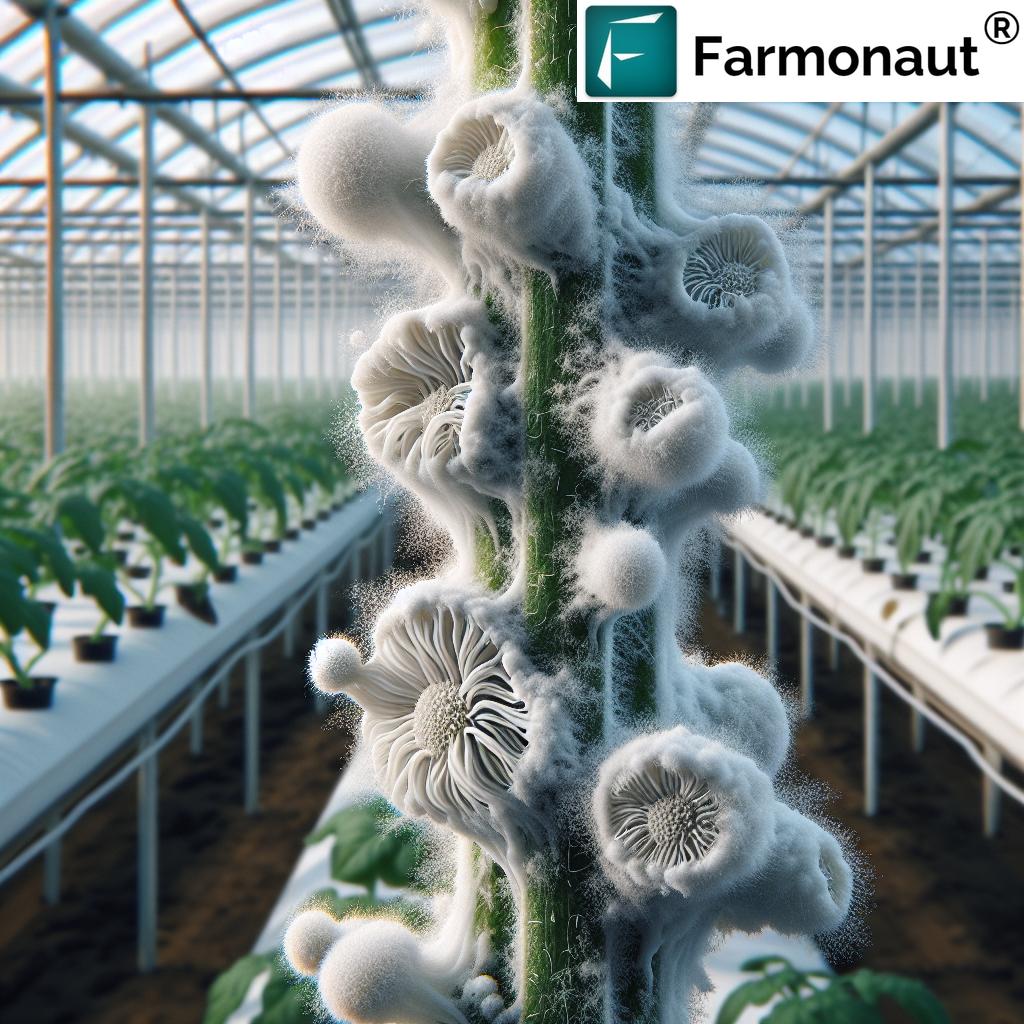The Ultimate Guide to Combating Aphids on Lemon Trees: Protecting Your Citrus Harvest

As agricultural technology experts at Farmonaut, we understand the challenges that citrus growers face, especially when it comes to pest management. One of the most common and persistent pests that lemon tree owners encounter is the aphid. In this comprehensive guide, we’ll explore everything you need to know about aphids on lemon trees, their impact on your citrus crop, and effective methods to control and eliminate these tiny but troublesome insects.
Understanding Aphids and Their Impact on Lemon Trees
Lemon tree aphids are small, soft-bodied insects that feed on the sap of lemon trees. These pests can quickly multiply and cause significant damage to your citrus plants if left unchecked. Here’s what you need to know about these pesky invaders:
- Appearance: Aphids are typically green, yellow, or black and measure about 1/8 inch in length.
- Reproduction: They can reproduce rapidly, with females giving birth to live young without mating.
- Feeding habits: Aphids use their piercing-sucking mouthparts to extract sap from lemon tree leaves and stems.
- Damage: Heavy infestations can lead to stunted growth, leaf distortion, and reduced fruit production.
Identifying Aphid Infestations on Lemon Trees
Early detection is crucial for effective aphid control. Here are some signs that indicate you may have aphids on lemon tree leaves:
- Curled or distorted leaves
- Sticky residue on leaves and branches (honeydew)
- Black sooty mold growth on leaves
- Presence of ants, which are attracted to the honeydew
- Yellowing or wilting of leaves
- Visible clusters of small insects on the undersides of leaves and new growth
The Impact of Aphids on Lemon Tree Health
Lemon aphids can have a significant negative impact on the health and productivity of your citrus trees. Here’s how these pests affect your lemon trees:
- Nutrient depletion: Aphids suck sap from the tree, depriving it of essential nutrients.
- Leaf damage: Feeding can cause leaves to curl, yellow, and eventually drop.
- Stunted growth: Heavy infestations can slow down or stop new growth.
- Reduced fruit quality: Aphid damage can lead to smaller, misshapen, or fewer lemons.
- Disease transmission: Aphids can spread plant viruses as they move from tree to tree.
- Secondary pest problems: The honeydew they produce attracts ants and promotes sooty mold growth.
Effective Strategies on How to Get Rid of Aphids on Lemon Trees
Now that we’ve identified the problem, let’s explore various methods to control and eliminate aphid infestations on your lemon trees. At Farmonaut, we recommend an integrated pest management approach that combines multiple strategies for the best results.
1. Cultural Control Methods
These methods focus on creating an environment that is less favorable for aphids:
- Prune and dispose of heavily infested branches.
- Avoid over-fertilizing, as excess nitrogen can attract aphids.
- Maintain proper tree spacing to improve air circulation.
- Remove weeds that may harbor aphids near your lemon trees.
- Use reflective mulches to confuse and repel aphids.
2. Biological Control
Encourage natural predators that feed on aphids:
- Ladybugs
- Lacewings
- Parasitic wasps
- Hoverflies
- Predatory midges
You can purchase and release these beneficial insects in your garden or create habitats that attract them naturally.
3. Physical Removal
For small infestations or on young trees, try these manual removal techniques:
- Blast aphids off with a strong stream of water from a hose.
- Wipe or prune off aphid-infested leaves and stems.
- Use sticky traps to catch winged aphids.
4. Organic Pesticides
If other methods aren’t sufficient, consider these organic options:
- Neem oil spray
- Insecticidal soaps
- Horticultural oils
- Diatomaceous earth (applied to soil around the tree)
5. Chemical Control
As a last resort, you may need to use synthetic pesticides. Always follow label instructions and consider the impact on beneficial insects:
- Systemic insecticides
- Pyrethroid-based sprays
- Imidacloprid products
Step-by-Step Guide: How to Get Rid of Aphids on a Tree
Follow these steps to effectively manage aphid infestations on your lemon trees:
- Monitor regularly: Inspect your trees weekly for signs of aphids.
- Identify the infestation level: Determine if it’s a light, moderate, or heavy infestation.
- Start with low-impact methods: Begin with water sprays or manual removal for small infestations.
- Introduce beneficial insects: Release ladybugs or lacewings if the infestation persists.
- Apply organic treatments: Use neem oil or insecticidal soaps for moderate infestations.
- Prune affected areas: Remove heavily infested branches and dispose of them properly.
- Consider chemical control: Use systemic insecticides for severe infestations as a last resort.
- Follow up: Continue monitoring and repeat treatments as necessary.
- Prevent future infestations: Implement cultural control methods to discourage aphid populations.
Homemade Remedies for Aphid Control
For those who prefer natural solutions, here are some DIY remedies to combat aphids on lemon tree leaves:
- Garlic spray: Blend garlic cloves with water, strain, and spray on affected areas.
- Soap solution: Mix 1 tablespoon of liquid dish soap with 1 quart of water and spray on aphids.
- Essential oil spray: Combine peppermint, clove, rosemary, and thyme oils with water and a small amount of dish soap.
- Tomato leaf spray: Soak tomato leaves in water overnight, strain, and spray on aphid-infested areas.
- Vinegar solution: Mix equal parts water and apple cider vinegar with a few drops of dish soap.
Preventing Aphid Infestations on Lemon Trees
Prevention is always better than cure. Here are some strategies to keep lemon tree aphids at bay:
- Maintain healthy trees through proper watering, fertilization, and pruning.
- Plant companion plants that repel aphids, such as marigolds, nasturtiums, and chives.
- Use reflective mulches around the base of trees to deter aphids.
- Install bird feeders to attract insect-eating birds to your garden.
- Avoid over-fertilizing, which can lead to soft, succulent growth that aphids love.
- Regularly clean up fallen leaves and debris around your lemon trees.
- Use row covers or fine mesh netting to protect young or vulnerable trees.
The Role of Technology in Aphid Management
At Farmonaut, we believe in leveraging technology to improve agricultural practices. Our satellite-based crop monitoring system can help detect early signs of stress in lemon trees, which may indicate pest infestations like aphids. Here’s how our technology compares to traditional monitoring methods:
| Feature | Farmonaut Satellite System | Drone-based Monitoring | IoT Sensors |
|---|---|---|---|
| Coverage Area | Large scale (Entire orchards) | Medium scale | Small scale (Individual trees) |
| Frequency of Data Collection | Daily to weekly | As needed (Manual flights) | Continuous |
| Cost-effectiveness | High | Medium | Low (High initial investment) |
| Ease of Use | Very easy (Cloud-based platform) | Requires skilled operator | Moderate (Setup and maintenance) |
| Data Analysis | Advanced AI and machine learning | Manual or semi-automated | Basic to advanced |
| Weather Independence | High (Can penetrate clouds) | Low (Affected by wind and rain) | High |
To learn more about how Farmonaut can help you manage your lemon orchards more effectively, visit our app page or explore our API documentation.
Integrating Farmonaut Technology in Lemon Tree Care
Our satellite-based monitoring system can provide valuable insights for lemon tree growers:
- Early detection of stress patterns that may indicate aphid infestations
- Vegetation health indices to track the overall health of your lemon trees
- Soil moisture analysis to optimize irrigation and reduce plant stress
- Historical data to identify trends and improve long-term pest management strategies
Download our mobile app for Android or iOS to access these features on the go.
The Future of Aphid Control in Lemon Orchards
As technology continues to advance, we at Farmonaut are excited about the future of pest management in citrus farming. Some emerging technologies and approaches include:
- Precision application of biopesticides using drones
- Gene editing to develop aphid-resistant lemon tree varieties
- Advanced pheromone traps for better monitoring and control
- AI-powered image recognition for early pest detection
- Blockchain-based traceability for organic pest control methods
Stay tuned to our developer documentation for updates on how we’re integrating these technologies into our platform.
FAQs About Aphids on Lemon Trees
Q: How quickly can aphids infest a lemon tree?
A: Aphids can reproduce rapidly, with populations doubling in as little as a week under favorable conditions.
Q: Can aphids kill a lemon tree?
A: While aphids typically don’t kill mature lemon trees, severe infestations can significantly weaken trees and make them vulnerable to other pests and diseases.
Q: Are there any beneficial aspects of aphids in a garden ecosystem?
A: Aphids serve as food for many beneficial insects and birds, contributing to biodiversity. However, their benefits are usually outweighed by the damage they cause to crops.
Q: How often should I treat my lemon tree for aphids?
A: Treatment frequency depends on infestation levels. Regular monitoring is key, with treatments applied as soon as aphids are detected, typically every 7-14 days during active infestations.
Q: Can I use the same aphid control methods on other citrus trees?
A: Yes, most aphid control methods for lemon trees are effective on other citrus varieties as well.
Conclusion: Winning the Battle Against Lemon Tree Aphids
Managing aphids on lemon trees requires vigilance, patience, and an integrated approach. By combining traditional pest control methods with advanced technology like Farmonaut’s satellite monitoring system, citrus growers can effectively protect their lemon trees from these persistent pests.
Remember, the key to success lies in early detection and prompt action. Regular monitoring, coupled with a combination of cultural, biological, and chemical control methods, will help ensure healthy, productive lemon trees.
For more information on how Farmonaut can support your citrus farming efforts, including advanced pest management strategies, consider subscribing to our services:
By staying informed and leveraging the latest agricultural technologies, we can work together to ensure bountiful, healthy lemon harvests for years to come.













